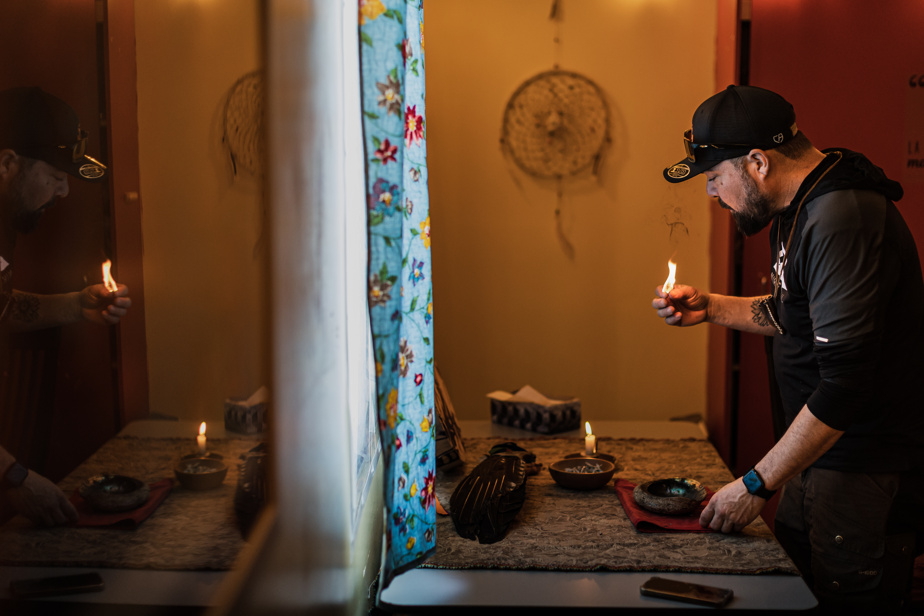(Mani-utenam) Uapishtan Vollant clutches a small black stone between his fingers. It is a traditional stone that was given to him when he started on his path to healing.
“It means a lot, it’s my strength. I’m less scared when I have my rock with me,” admits the 49-year-old Innu.
Uapishtan Vollant is still “in recovery”. He came here, to the Uapan Utshekatak center in Mani-utenam, to banish his demons: drugs, alcohol and gambling. “When I entered, I was far away”, admits the one who has been sober since January. “I’m clean,” he said calmly.
The Uapan Utshekatak center opened its doors at La Presse on a sunny, but still chilly, Saturday in late March.
Intervener Josée Vollant accepted, at our request, to bring together some members of the Uashat mak Mani-utenam community who followed a healing session.
They are ten to form a large circle. They are between 13 and 68 years old. They stayed at the center for different reasons, but with a common goal: to get better. Together, they want to deliver a message of hope.
Because there are also people who heal.
La Presse reported Friday that the use of drugs, particularly cocaine derivatives, has been wreaking havoc in the Innu community located about fifteen kilometers east of Sept-Îles, since the pandemic. The authorities are on their toes, the Legault government promises action shortly.
“I’ve been sober for 600 days,” Rocky St-Onge said to loud applause from his comrades. The consumption of cocaine plunged him into hell. Family crisis, stay in psychiatry, dark thoughts… The 37-year-old father has come a long way.
“I wanted to die. We’re going to talk about real business here… I wanted to take my own life. It wasn’t so much that I wanted to die, but I didn’t want to feel anything anymore,” he says confidently. His “harsh past” had repercussions on those close to him. He knows it well.
Two of his children, Mayna and Charles St-Onge, 15 and 13, are part of the circle. They listen attentively to their father recounting his journey. Tears stream down Charles’s cheeks.
“I saw them, my children,” Rocky continues. His throat constricts, then he starts again.
“I’ve forgiven,” Charles retorts, his voice shaking. He and his sister are now involved in the Uapan Utshekatak center, which offers stays for young people aged 14 to 17.
“When I’m the caregiver, it makes me feel good. It makes me feel good to see people who are healing,” the boy says, his eyes reddened.
The Uapan Utshekatak center is well established in Mani-utenam. From the outside, the little faded blue house looks like nothing. Yet inside, great things are happening, according to the group. “When you walk out of here, you carry a light,” Rocky St-Onge assures.
“We have to carry this light that makes the world want to come here [to heal themselves],” he adds.
The popularity of the session, which lasts four days, is undeniable. “I don’t even have time to post [the availability], it fills up quickly,” illustrates Ms. Vollant. Word of mouth in the community of some 4,500 souls is also doing its work.
This is not Uapishtan Vollant’s first therapy. It has been two years since he got rid of his addiction to alcohol, but for drugs, it is more difficult. He relapsed last year. “It’s a perpetual fight. Every day,” recounts this former cocaine user, stroking his traditional stone.
“You have to really want to get out of this,” he continues.
The problem is such that interview participants refer to it as “community healing”.
The Innu Council Takuaikan Uashat mak Mani-utenam claims to have improved the offer of community services in recent years. The Pakatan symposium on suicide prevention, drug addiction, mental health and cultural identity begins this week.
Uauitshitun social services on Friday reported a meteoric rise in service requests since the pandemic. It’s also a signal, according to coordinator Alice Guimond, that the community is asking for help.
Sitting next to Ms. Vollant, Karine Régis is one of the last to speak. “I am a child of residential school survivors. My parents attended it, I grew up in the world of alcohol, violence, drug addiction,” she says.
“I’ve never had a substance abuse problem,” the 50-year-old says. However, she struggled to live. A pain that she was able to calm in the center. Today, she clings to the future.
“I refuse to see my community as foreigners see us, as vulnerable people, alcoholics, drug addicts… I am from a community in recovery”, she pleads with conviction. “When I see Charles and Mayna, it gives me hope. »
“I believe in my community, I believe in recovery. »
Uapan Utshekatak means “morning star”. The one you still see at dawn, explains Josée Vollant.
That afternoon, in the little blue house, she still shone in the eyes of those survivors.

